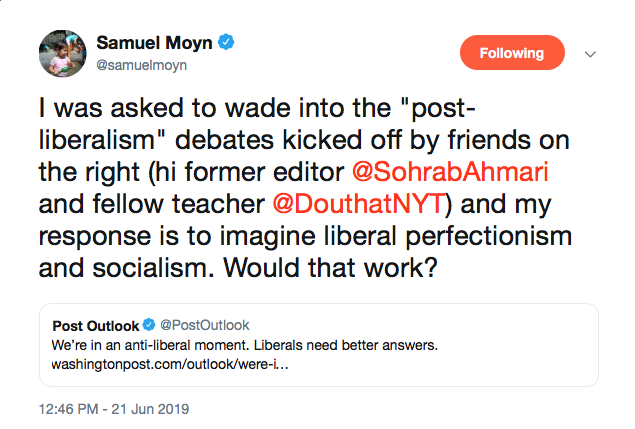Again on aestheticized politics, and again on Bersani, on Liberalism and Moyn.
Ryan Cooper calls Mike Davis' new piece in the NLR "disappointingly glib". Cooper is one kind of moralist; Davis is another. Davis is in love with decay, meaning in love with death. I read a bit of him years ago and it annoyed me, meaning of course that the writing annoying me. Everything worth reading is worth reading as a primary text: reading for form is reading for subtext. Marxist millenarianism, (and again). Cooper has no sense of any of this of course. Just as he has no sense of the actual situation in Chile.
Jäger fittingly (see link in the last parentheses) links to Tablet, and a piece which wraps this all into a package, with a nice ribbon and a pretty bow. It's as openly perverse as Vermeule and Ahmari.
I used to drink with a Croatian Nazi and an Israeli fascist, both ex-military. They were friends. Barbarism and the academic defense of barbarism are very different things, and the Croat had the best short war story I've ever heard—"Cover me! I'm goin' for a beer."—a great description of urban warfare in your own country. Unlike Borges and the leftists of the library, I don't worship killers, but I've known a few, and even liked them.
Taubes had visited Schmitt, with whom he maintained a long epistolary relationship, the year before the latter’s death in 1985. In that meeting, he and Schmitt had read together Paul’s letter to the Romans, debating whether the text founded—as Schmitt believed it did—enmity between Christians and Jews. Taubes argued against Schmitt’s interpretation of Paul, which seemed to give scriptural justification for the murderous antisemitism Schmitt had endorsed as the leading legal thinker of the Third Reich. He gave his own reading of the text, and “when I had finished explaining everything to him,” Taubes said, Schmitt insisted that Taubes must, before he died, reveal it to the world.
Obeying the wish of the eminent, dying Nazi, Taubes, now dying himself, would speak about Paul, “as a Jew, not as a professor, a title to which I don’t attribute much importance.” This was not to be a scholarly exercise, but an existential confrontation with the question of Messiah—and of his enemies. The latter, Taubes argued, are those who seek to “hold back” the end of the present world, who believe that it can get along for itself without a “living God” who appears unpredictably into history and into our lives. He calls these people, with contempt, “liberals.” Paul, he argued, was “more Jewish than all the liberal or reformed rabbis” who prayed only half-heartedly for Messiah.
All philosophy is perverse. The perfect is the enemy of the world.
"Should a homosexual be a good citizen?" Leo Bersani asked in Homos in 1995, expressing a gay skepticism that has dogged every upsurge of gay politics. Bersani's doubt results from his diagnosis of "the rage for respectability ... in gay life today." He locates that rage in postmodern dissolutions of gay identity, in clamors for gay marriage and gay parenting, in queer antisepticizings of gay sex. "Useful thought," Homos suggests, might result from "questioning the compatibility of homosexuality with civic service." And from questioning more: Bersani makes a claim about social being itself. He hypothesizes "that homo-ness ... necessitates a massive redefining of relationality," that it instances "a potentially revolutionary inaptitude perhaps inherent in gay desire for sociality as it is known." If there is anything "politically indispensable" in homosexuality, it is its "politically unacceptable" opposition to community. Thus Homos paradoxically formulates what might be called "the antisocial thesis" in contemporary queer theory.Bersani's formulation and others like it have inspired a decade of explorations of queer unbelonging. Meanwhile, pace scholarship, gay rage for normalizing sociability—to judge by the gay-marriage boom alone has intensified.Given such divergent developments, I suggested to my colleague on the MLA's Division Executive Committee for Gay Studies in Language and Literature that stocktaking of the antisocial thesis might be in order.
I'm a lazy scholar, but this shit marks the transition of the radical/reactionary anti-politics of the demimonde into respectability. Homosexual self-hatred is defended by philosophers for whom disgust of the body is a given, but is now along with the self-hatred of "gender dysphoria", hidden behind the facade of the "liberal" academy: people so ideologically opposed to history that they've rationalized themselves into optimistic fascism.
Thug life is barbarism. It needs no written philosophy. It needs no defense. It's not opposed to art. As I've said more than once, maybe not here, if art were about morality, killers wouldn't know how to dance.
Arendt on public and private life, and the and privacy of pain. She doesn't go far enough/wide enough. she shies away, at least in public.

No comments:
Post a Comment
Comment moderation is enabled.